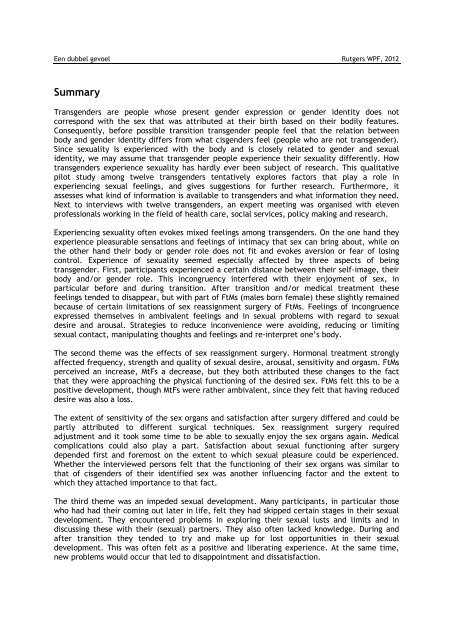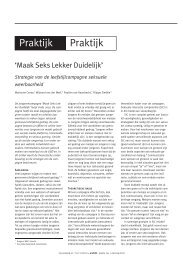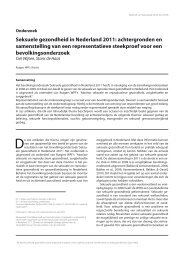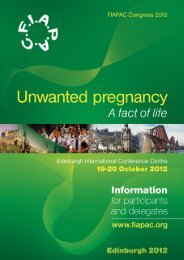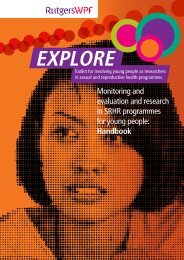EEN DUBBEL GEVOEL - Rutgers WPF
EEN DUBBEL GEVOEL - Rutgers WPF
EEN DUBBEL GEVOEL - Rutgers WPF
You also want an ePaper? Increase the reach of your titles
YUMPU automatically turns print PDFs into web optimized ePapers that Google loves.
Een dubbel gevoel <strong>Rutgers</strong> <strong>WPF</strong>, 2012<br />
Summary<br />
Transgenders are people whose present gender expression or gender identity does not<br />
correspond with the sex that was attributed at their birth based on their bodily features.<br />
Consequently, before possible transition transgender people feel that the relation between<br />
body and gender identity differs from what cisgenders feel (people who are not transgender).<br />
Since sexuality is experienced with the body and is closely related to gender and sexual<br />
identity, we may assume that transgender people experience their sexuality differently. How<br />
transgenders experience sexuality has hardly ever been subject of research. This qualitative<br />
pilot study among twelve transgenders tentatively explores factors that play a role in<br />
experiencing sexual feelings, and gives suggestions for further research. Furthermore, it<br />
assesses what kind of information is available to transgenders and what information they need.<br />
Next to interviews with twelve transgenders, an expert meeting was organised with eleven<br />
professionals working in the field of health care, social services, policy making and research.<br />
Experiencing sexuality often evokes mixed feelings among transgenders. On the one hand they<br />
experience pleasurable sensations and feelings of intimacy that sex can bring about, while on<br />
the other hand their body or gender role does not fit and evokes aversion or fear of losing<br />
control. Experience of sexuality seemed especially affected by three aspects of being<br />
transgender. First, participants experienced a certain distance between their self-image, their<br />
body and/or gender role. This incongruency interfered with their enjoyment of sex, in<br />
particular before and during transition. After transition and/or medical treatment these<br />
feelings tended to disappear, but with part of FtMs (males born female) these slightly remained<br />
because of certain limitations of sex reassignment surgery of FtMs. Feelings of incongruence<br />
expressed themselves in ambivalent feelings and in sexual problems with regard to sexual<br />
desire and arousal. Strategies to reduce inconvenience were avoiding, reducing or limiting<br />
sexual contact, manipulating thoughts and feelings and re-interpret one’s body.<br />
The second theme was the effects of sex reassignment surgery. Hormonal treatment strongly<br />
affected frequency, strength and quality of sexual desire, arousal, sensitivity and orgasm. FtMs<br />
perceived an increase, MtFs a decrease, but they both attributed these changes to the fact<br />
that they were approaching the physical functioning of the desired sex. FtMs felt this to be a<br />
positive development, though MtFs were rather ambivalent, since they felt that having reduced<br />
desire was also a loss.<br />
The extent of sensitivity of the sex organs and satisfaction after surgery differed and could be<br />
partly attributed to different surgical techniques. Sex reassignment surgery required<br />
adjustment and it took some time to be able to sexually enjoy the sex organs again. Medical<br />
complications could also play a part. Satisfaction about sexual functioning after surgery<br />
depended first and foremost on the extent to which sexual pleasure could be experienced.<br />
Whether the interviewed persons felt that the functioning of their sex organs was similar to<br />
that of cisgenders of their identified sex was another influencing factor and the extent to<br />
which they attached importance to that fact.<br />
The third theme was an impeded sexual development. Many participants, in particular those<br />
who had had their coming out later in life, felt they had skipped certain stages in their sexual<br />
development. They encountered problems in exploring their sexual lusts and limits and in<br />
discussing these with their (sexual) partners. They also often lacked knowledge. During and<br />
after transition they tended to try and make up for lost opportunities in their sexual<br />
development. This was often felt as a positive and liberating experience. At the same time,<br />
new problems would occur that led to disappointment and dissatisfaction.


